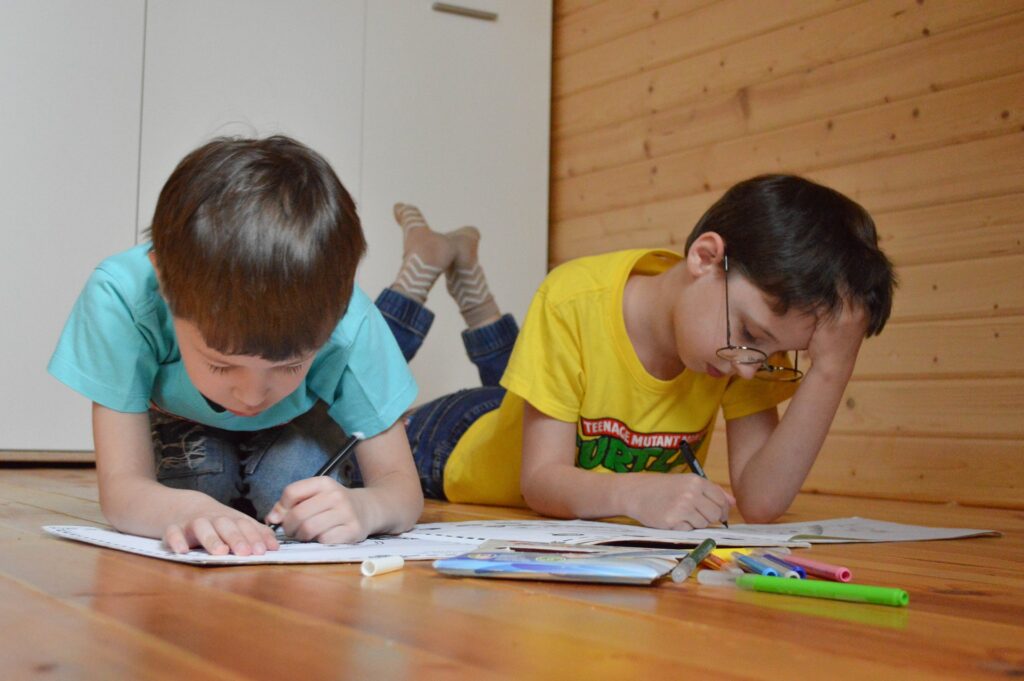
Contrary to common belief, There are several benefits of homeschooling for children’s social development.
Contents
- 1 Benefits of Homeschooling For Social Development
- 2 Homeschooling Helps Children Develop Social Skills Through Role Modeling
- 3 Find Ways To Provide Social Opportunities
- 4 Homeschooling Protects Children From Bullying
- 5 Homeschooling Fosters A Strong Family Bond
- 6 It Encourages Autonomy And Independence
- 7 Flexibility
- 8 Home Schooling Helps Children Make Connections With Other Children
- 9 A Home schooled Child Can Interact with Other Kids in Extra Curricular Activities
Benefits of Homeschooling For Social Development
Not only does it protect them from bullying, but it also helps them develop social skills through role modeling.
Furthermore, it helps them connect with other children and makes them independent.
This article will explain the benefits of homeschooling for children’s social development.
Read on to find out more! And don’t forget to share this article with your friends and family!
Homeschooling Helps Children Develop Social Skills Through Role Modeling
Social skills are an important part of a child’s development, and homeschooling parents can help by role modeling appropriate social behavior.
They can write scripts of social situations, or role play with their children.
Adding video-based resources to subject areas can also help. By engaging in these activities with their child, parents can generalize these skills to other situations.
Practicing outside of school will also help your child gain more experience with appropriate social behavior.
Because homeschooling is a less crowded environment, children can be exposed to more adults and learn from them.
Homeschoolers also have more time for exploration and can engage in community projects.
In addition, homeschoolers tend to perform better on standardized tests.
The freedom to explore and connect with other children means that homeschooling allows children to develop social skills in a more natural way.
The advantage of homeschooling is that it allows children to develop relationships based on common interests.
Find Ways To Provide Social Opportunities
However, some children are shy or introverted, so homeschooling can make the process a bit more difficult.
Parents need to find ways to provide social opportunities, regardless of whether they’re in a traditional or online setting.
Parents should find ways to help their children connect with other children to make new friends.
They can even take advantage of community-based classes or playdates to meet new people.
For older children, homeschooling may even help them gain work experience by completing part-time jobs.
While socialization is primarily about being good friends with their peers, it also requires the ability to interact with other people of all ages.
Prisma’s curriculum helps children build these skills through developing relationships with other members of the community.
The curriculum provides an excellent opportunity for parents to model good behaviors for their children.
Despite the lack of formal education, children can easily engage in social activities outside of school.
Homeschoolers often interact with many different types of children and parents of all ages.
The older children in the homeschool community can be role models for younger children. These children can use these role models to develop confidence in themselves.
This way, they will have a better understanding of the world around them. If parents aren’t comfortable with public school, homeschooling may be the best choice.
Homeschooling Protects Children From Bullying
Many parents wonder if homeschooling protects their children from bullying, and if so, how.
This debate continues to rage as a law professor at Harvard University and the executive director of the Coalition for Responsible Home Education writes that the law makes it more difficult for parents to pull their children out of school.
The law makes it more difficult because it doesn’t allow parents to simply change their minds and decide to homeschool.
Still, there are many good reasons for homeschooling, and many of these arguments are legitimate.
The biggest issue with homeschooling is that it does not address the root cause of bullying. While this issue is largely psychological, it’s still important to educate your child about social skills and how to deal with bullies.
Homeschooling doesn’t teach your children how to deal with bullying; it does not prepare them for the world.
In addition, it doesn’t teach them problem-solving skills, which are critical for coping with bullying in general.
While homeschooling does not remove children from peer pressure, it does protect them from developing coping skills and a strong desire to learn.
A child’s lack of exposure to peer pressure and group dynamics will result in fewer deviant behaviors and less difficulty making friends.
It will also teach children to be sensitive about the issues they encounter. But how does homeschooling protect children from bullying? Let’s examine some of the evidence behind this controversial issue.
Some homeschooling parents are concerned about their children’s peer dependence and bullying. In such a situation, homeschooling with a tutor may be a better option.
The first step is to warn children about the problem. Bullies should know that children should never show signs of fear, and it’s a mistake to assume that kids will get along.
In addition, parents should warn children to keep their friends close.
Homeschooling Fosters A Strong Family Bond
Homeschooling fosters a strong family bond. Strong relationships between parents and children will reduce the importance of peer opinion. It’s also a great way to boost a child’s confidence.
This will help them avoid bullies and keep them in a supportive environment. When bullying occurs, it’s crucial to protect your child from bullying.
It Encourages Autonomy And Independence
Studies have shown that children benefit from a strong sense of autonomy, and homeschooling allows parents to encourage this development.
By encouraging autonomy in their children, parents can teach them how to make decisions and pursue interests, rather than forcing them to fit into a set curriculum.
Homeschooling also helps to reduce the amount of behavior modification, which is common in schools.
Instead, children should be encouraged to learn based on their natural interests and inclinations, which is intrinsic motivation.
The socialisation process involves changing an individual’s behavior to fit in with society. Socialisation involves various aspects, including exposure, influence, and activity.
Socialisation in home education focuses on a child’s experiences in a social setting and how they develop in such environments. These experiences build the socialisation of the individual.
Flexibility
Another major benefit of homeschooling is flexibility. Parents can weave in their child’s interests, lifestyle, and career interests into their child’s education.
By making their learning schedule fit into their life, parents can customize the way they learn and make the experience as satisfying as possible.
Although some unschooled children do spend time around other children, they may lack the structure and consistency required to develop the necessary social skills.
Research has shown that a child’s autonomy and independence is improved when parents and teachers have a similar personality type.
A high-quality home-schooling environment encourages autonomy and independence.
Parents and teachers who share similar values are more likely to be supportive of a child’s wishes and interests.
And they are more likely to be able to predict social outcomes than those who are matched based on SES.
Home Schooling Helps Children Make Connections With Other Children
If you’re considering homeschooling for your child, you might wonder if your child will develop their social skills the way other children do. After all, socialization happens in groups right?
This problem that homeschooled kids are may be socially impaired is frequently brought up by professional educators who don’t completely comprehend the variety of homeschooling methods.
They think that schools are the only place where kids may pick up social skills. But it’s simply untrue!
Social skills are often improved by homeschooling. Children who are homeschooled are not exposed to peer pressure, violence, drugs, or other detrimental influences that are present in today’s schools.
Home schooled children can still engage in various social activities with other kids outside their home school schedule.
Homeschooling can help children with their social development. Fortunately, there are many advantages of homeschooling.
Most studies show that homeschooling does not harm social development, while some show that homeschoolers score higher than school-attending children.
Socialization is a fundamental aspect of human development. It helps us learn how to interact with others and behave properly in society.
Homeschooling allows children to interact with a variety of different people and families. Children of different ages and generations can get along well with each other.
Older children can act as mentors to younger ones, and this can help develop their confidence.
However, home schooling can also make your child more independent and develop their social skills by giving them more freedom and responsibility to learn.
A Home schooled Child Can Interact with Other Kids in Extra Curricular Activities
A homeschooled child can participate in public school extracurricular activities, and many states require homeschoolers to do so.
By signing up for sports and arts and crafts classes, children can make connections with other children.
Additionally, participation in community church activities may also improve their social development.
And if you want to make friends with other children, homeschoolers can join co-ops, which are typically run by parents.
One benefit of homeschooling is that children spend more time with their siblings.
Children spend a greater amount of time playing with siblings than their public-schooled counterparts, and they have the opportunity to model their older siblings and care for younger ones.
These real-life interactions foster closer bonds between siblings.
A homeschooled child also learns about diverse socioeconomic conditions, which can help children grow up a more compassionate and responsible person.



